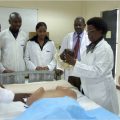Those planning to become a doctor in future do not limit their education to the Bachelor of Medicine and Bachelor of Surgery (MBBS) degree and move to certain specializations. An aspiring doctor’s medical journey usually starts after the completion of the MBBS degree. This is when the students have to decide their branch of medicine and the specialty they wish to study. There are a number of different branches of medicine that are designed to offer specialist care. In Nigeria, Three colleges that train doctors to become specialist are:
The National Postgraduate Medical College of Nigeria: The National Postgraduate Medical College of Nigeria is a parastatal of the Federal Government Ministry of Health. It has 15 approved Faculty Boards for training, evaluation and certification of medical and dental doctors.
West African College of Physicians: This college was established in 1976 and trains specialists physicians in Community Health, Family Medicine, Internal Medicine, Laboratory Medicine, made up of its major specialties of Anatomical Pathology, Chemical Pathology, Hematology and Medical Microbiology, Pediatrics and Psychiatry.
West African College of surgeons: The College trains surgeons in the sub region by frequent organization of postgraduate courses in Lagos, Accra, Benin, and Ibadan. The Diplomas of the College are recognized in the participating countries and guaranteed by the signatories of the West African Health Community Treaty. The disciplines include, Anesthesiology, Dental Surgery, Obstetrics and Gynecology, Ophthalmology, Oto-rhino-laryngology and Radiology. SEE: The 7 Best and Greatest Doctors Ever Produced By Nigeria.
Many specialists that practice in Nigeria complete their training either partially of fully abroad. Some of the branches of medicine are:
- Cardiology
Cardiologists are doctors who deal with the health of the heart and blood vessels. It is one of the highest paying medical specialties owing to the intricacies involved in dealing with heart ailments. Invasive cardiology is a branch that deals with surgeries and invasive procedures of the heart such as angiograms and angioplasties. According to a Forbes report, a cardiologist can earn a salary of about 500,000- 950,000 Naira per Month in Nigeria. This branch of medical specialty has a tremendous scope as transplants, open-heart surgeries, pacemaker implants are becoming common these days.
- Orthopedics
This medical super-specialty deals with the health and diseases of bones and muscles. The musculoskeletal system is the framework of the body and is prone to damage from activities of daily living. Orthopedics treat clients with problems of the bones, joints and congenital anomalies of the bones, infections, cancer and progressive diseases of the bones. Sports orthopedics and rehabilitative orthopedics are emerging specialties within bone science. These doctors make the most money of all the medical specialties as orthopedic surgeries and implants are costly. The average salary for these doctors is about 400,000- 900,000 Naira per Month in Nigeria.
- Gastroenterology
Gastroenterologists are those doctors who deal with the problems of stomach and intestines and all the accessory digestive organs. Cancers of the colon and the digestive system are the most common among people of all ages owing to the faulty food practices of people. Doctors dealing with invasive gastroenterology and GI cardiology are in high demand in India as they specialize in endoscopy, GI surgery and GI anastomosis surgeries performed in tumors of the digestive tract.
- Urology
Urology is a medical super specialty that focuses on the health and illnesses of urinary system of both the genders. A number of organs fall under the domain of urology such as kidney, bladder, prostate, urethra and the male genital organs. They diagnose the problems of the kidney, bladder and other organs and propose medical and surgical management of these disorders. Urologists are also in high demand as more number of men report urinary problems, secondary to their sedentary lifestyle and faulty food practices. Metabolic disorders such as diabetes mellitus also result in failure of renal organs necessitating consultation from urologists. The average annual salary of urologists in India is expected to be between 500,000- 950,000 Naira per Month in Nigeria.
- Anesthesiology
The volume of surgeries that are being conducted in Indian hospitals has enhanced many folds owning to the availability of world-class equipment and highly talented surgeons in the country. India is also the hub for medical tourism as it is the center for world-class medical facilities at an affordable cost. Anesthetists play an important role in keeping the patient sedated and pain-free during painful surgical procedures. They are also the highest-paid doctors in the country second only to neurosurgeons. An anesthetist can charge anywhere between 150,000 – 300,000 per surgery depending on its complexity.
- Plastic surgery
This is an emerging medical specialty that deals with medical aesthetics. Plastic surgeons work on different body parts and enhance their appearance and beauty. Women are becoming fans of plastic surgeons as they help in shaping up of their torso, lips and other body parts. Reconstructive surgeries are lifesavers for acid victims, burn victims and for those who wish to enhance their facial features. These technicians make use of implants, skin grafts, tissue transfers, liposuction and other methods to enhance the appearance of the clients. Depending on the nature of the procedure, these physicians earn about 1,000,000 naira per surgery in Nigeria.
- Family Physician
Family medicine is one of the primary care specialties. Family practice physicians see patients of all ages, provide basic care for a variety of common ailments, are usually the first to recognize major health problems, and may order diagnostic tests or refer you to a specialist.
- Internal Medicine Physician
General internists provide primary care to adult patients and can pursue additional training after internal medicine residency to sub-specialize in a variety of other areas, such as gastroenterology, endocrinology, or cardiology. Internists usually have more hospital-based training than family practitioners and may have an office-based practice or work as hospitalists, primarily seeing patients in the hospital.
- Pediatrician
Pediatricians take care of younger patients, from infancy through age 18 or, in some cases, age 21. Pediatricians provide primary health care to children, including immunizations, well-baby checks, school physicals, and treatment of coughs, colds, and stomach flu, among many other things. More seriously ill or complicated patients may be referred to a pediatric sub-specialist for specialized treatment.
- Obstetrician/Gynecologist (OB/GYN)
A gynecologist is a doctor who specializes in women’s health, which includes reproductive health, menopause, and hormone problems. An obstetrician provides care for women that are pregnant and are trained to deliver babies. Often, these specialties are combined, in which case the physician is referred to as an OB/GYN.
- Surgeon
Surgeons can be trained in general surgery or in more specialized areas of surgery, such as hand surgery, pediatric surgery, surgical oncology, or vascular surgery. Surgeons spend time planning a surgical procedure, performing surgery in the operating room, and then following up postoperatively to identify complications and to confirm that the procedure was a success. They earn 500,000- 950,000 Naira per Month in Nigeria. The training to become a surgeon is typically several years longer than training for primary care.
- Psychiatrist
A psychiatrist specializes in mental health and treats emotional and behavioral problems through a combination of personal counseling (psychotherapy), psychoanalysis, hospitalization, and medication. Psychiatrists may be office-based, hospital-based, or a combination of the two. There are a number of different specialty areas within psychiatry. For instance, some psychiatrists may focus on child and adolescent psychiatry, addiction medicine, or eating disorders. SEE: List Of Psychiatric Hospitals In Nigeria.
- Dermatologist
Dermatology is a very competitive field for physicians. Typically, only the very top medical students are accepted into dermatology residency programs. This is because dermatologists are very well compensated due to aesthetic and cash-pay elective procedures such as Botox, laser treatments, and more. Plus, the quality of life is excellent compared to peers in medicine, with little to no on-call time required due to the nature of the work.
- Endocrinologist
A sub-specialty of internal medicine, endocrinologists treat the endocrine system the glands that produce and secrete hormones that control and regulate nearly all of the body’s functions. People with diabetes or thyroid disease are often treated by an endocrinologist.
- Infectious Disease Physician
Infectious disease physicians deal with infections that are hard to diagnose or treat. A sub-specialty of internal medicine, infectious disease physicians treat serious infections such as the swine flu, bird flu, and HIV/AIDS, among other communicable diseases. These group of doctors are currently in charge of managing the COVID 19 pandemic in Nigeria.
- Nephrologist
Nephrologists treat kidney disease and prescribe dialysis for those experiencing kidney failure. These physicians train in internal medicine and then sub-specialize in nephrology, which requires an additional two to three years of fellowship training.
- Ophthalmologist
Ophthalmologists are medical doctors who treat diseases or disorders of the eyes, such as cataracts and glaucoma. They perform eye surgery when necessary. Vision correction that cannot be handled by an optometrist may be treated by an ophthalmologist.
- Otolaryngologist
Otolaryngologists, also known as otorhinolaryngologists, are more commonly referred to as ENTs, which stands for “ear, nose, and throat.” Otolaryngology is another field that entails a combination of surgical skills and office-based medicine and treatment. ENTs cover a lot of issues including sinus problems, allergies, head and neck cancers, and more. As a result, many physicians sub-specialize in a specific area of otolaryngology.
- Pulmonologist
Pulmonologists treat the cardio-pulmonary system, which consists of the organs that work together to help a person breathe, such as the lungs and heart. Their training is often critical care medicine in conjunction with pulmonary disease. As a result, they may work as intensivists (physicians who cover the intensive care unit) in addition to seeing patients in an office setting to treat breathing disorders, severe allergies, lung problems, and other respiratory diseases.
- Neurologist
Neurologists are doctors who take care of patients with medical conditions that affect the brain, spine, or nerves. Neurologists see patients who have complex medical disorders, such as Parkinson’s disease, multiple sclerosis, and neuropathy. They also take care of patients who have common problems such as migraine headaches and dizziness.
- Radiologist
A radiologist is a physician who is trained in looking at and interpreting diagnostic tests. Often, the treating physician must look at the test as well, but the radiologist’s interpretation and report can offer additional information or advice for further testing.
- Oncologist
Oncology is a sub-specialty of internal medicine which has three main areas: medical, surgical, or radiation oncology. Oncologists take care of patients who have cancer by treating the cancer itself, as well as the symptoms caused by the disease. Often, oncologists take part in clinical trials, using new and experimental treatments for cancers that are otherwise incurable. Also SEE: Types Of Medical Doctors In Nigeria.





